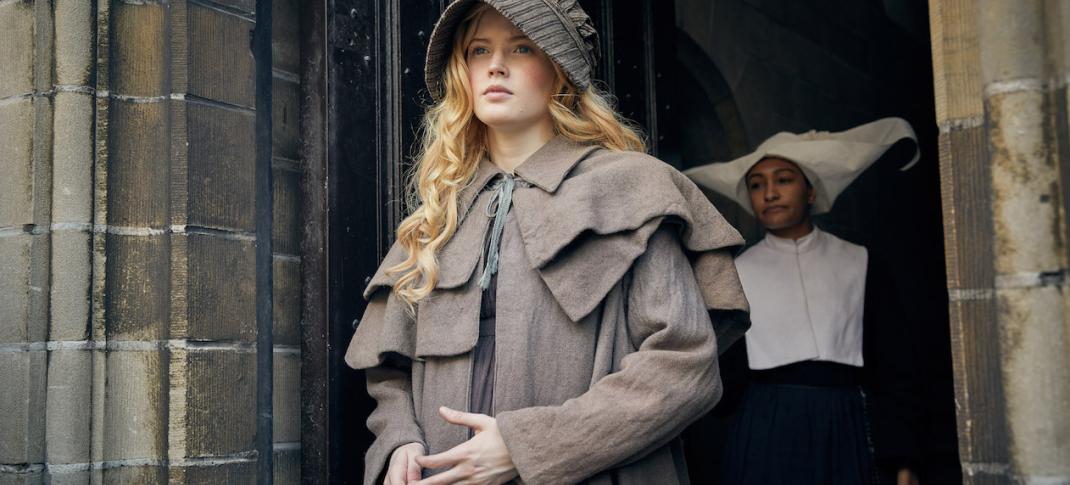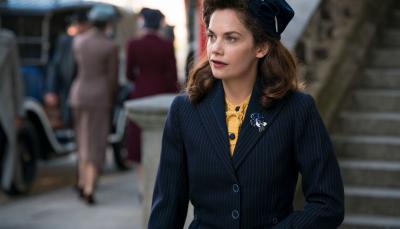'Les Miserables' Episode 4 Recap: In My Life

MASTERPIECE “Les Misérables” Sundays, April 14 - May 19, 2019 at 9pm ET on PBS Episode Four Sunday, May 5, 2019; 9-10pm ET Now a young woman, Cosette moves to Paris under Valjean’s protection. There, she meets the handsome law student Marius, who unwittingly brings a nightmare to life. Picture Shows from L to R: Cosette (ELLIE BAMBER), Sister Simplice (NATALIE SIMPSON) For editorial use only. Photographer: Robert Viglasky (C) Lookout Point
Copyright: Lookout Point
Previously on Les Miserables: After another several-year stint in prison, Valjean breaks out, retrieves his bottomless secret stash of money – seriously were those candlesticks made of diamonds?? – and heads to Montfermeil to finally rescue Fantine’s daughter. Getting a tiny child to care for is the saving of Jean Valjean’s character as he suddenly becomes gruff, caring and kind of adorable instead of just feral and self-centered. Unfortunately, Javert is still stalking Valjean across the entire countryside of France and this eventually drives Valjean and Cosette to take shelter in a kind nunnery, where the Mother Superior breaks something like a hundred years of tradition by letting a man into their holy building and lying to the police. I guess Valjean must have a really nice face?
It’s unfortunate for Les Miserables that the worst part of its story is something that no adaptation has yet quite figured out how to fix, given that this character is a key piece of so many of its major arcs. And that is the fact that Marius Pontmercy is the worst.
The. Worst.
In the musical, we watch him moon about over Cosette, cosplay as a revolutionary with his more dedicated friends and treat Eponine as an afterthought whose emotions he can use for his own benefit whenever it's convenient. Here, Marius is just as much of a dishrag as ever, though this particular adaptation at least tries to give his revolutionary tendencies some roots by introducing his stridently royalist grandfather and giving him a sad and lonely childhood where his Bonapartist dad watches over him from the shadows at Sunday mass. Yawn, is all I can say.

Marius is the weakest part of Les Miserables because he is the most boring element of every story in which he is involved. Cosette is the more compelling figure in their – admittedly kind of bland – love affair, as she’s openly defying her father and reaching for a world she wants with both hands. He is the least convincing of his revolutionary friends, because his beliefs are not based in any reality beyond anger at the lies his grandfather once told him – he’s not really ever suffered or struggled, and even at his most genuine-seeming moments, he doesn’t come across as serious or thoughtful as Enjolras and his friends. Marius, as per usual, kind of seems almost along for the ride pretty much everywhere.
Perhaps that’s part of the reason his dark night of the soul over whether to turn the clearly despicable Thenardier in when he’s so obviously about to try and commit a heinous crime rings so hollow. Marius is a lawyer-in-training after all. The idea that he would consider letting such a vile man harm someone simply because the aforementioned criminal helped the father he met all of one time just…whew. And it’s not like Marius didn’t know Thenardier was garbage long before Cosette’s father was ever involved in the story.
Granted, the sequence in which Valjean and Thenardier confront one another once more –under the guise of Valjean once again helping someone in need – is tense and exciting to watch. Though I personally could have done without Valjean proving his toughness by burning halfway through his own arm. Yikes, dude. We get it, you’re like, crazy hardcore. Dominic West is SO much better at playing the kind and warm Valjean than he is the massive strongman aspect – he honestly just doesn’t have the body type for it, and whenever Les Mis needs me to believe that he can like, life an ox cart with his bare hands or fight five dudes all by himself, it’s…well, it’s a struggle.

On another note, it seems worth mentioning that this particular adaptation is doing a rather lovely job of rehabilitating and expanding the character of Eponine. Yes, she still has an unfortunate crush on Marius, but at least she’s got more to do than moon around after him the way she does in the stage version (which blew that entire thing well beyond what was depicted in the book). Here, we strike a sort of nice medium – Eponine clearly fancies Marius, but not enough to turn her entire life over to him. (Or, at least, not yet. We’ve still got two episodes to go.) This Eponine is a streetwise survivor, who manages to scratch out something like a life for herself without letting her odious family break her spirit. (Though her multiple strip teases for Marius – both real and imagined – are a bit hard to take.)
Then again, no relationship in this series is particularly idyllic. Men beat their wives, abandon their promises and are generally all around terrible, most of the time. Even the flirtation that will eventually become the Marius and Cosette romance isn’t initially portrayed as all that swoon-worthy here. While it’s clear that each thinks the other’s attractive –Marius’ initial feelings for Cosette seem to have a distinctly more sexual tinge, and hers are almost completely about rebelling against her father’s “prison-like” control over her life.
We spend more time watching Marius spy on his neighbor and Cosette fight with her adopted father about the state of the world than we see either of them think or moon over the other. Marius’ mopiness is repeatedly tired to his rich-but-sad childhood, and Cosette’s starry-eyed attitude toward the outside world she has no concept of is repeatedly presented as almost dangerously naïve. Both of them clearly have a lot of growing up left to do, and maybe in this version of the story we’ll get to see them realize that, whether they’re together or not.
What did you think of this episode of Les Miserables? Let’s discuss in the comments!




